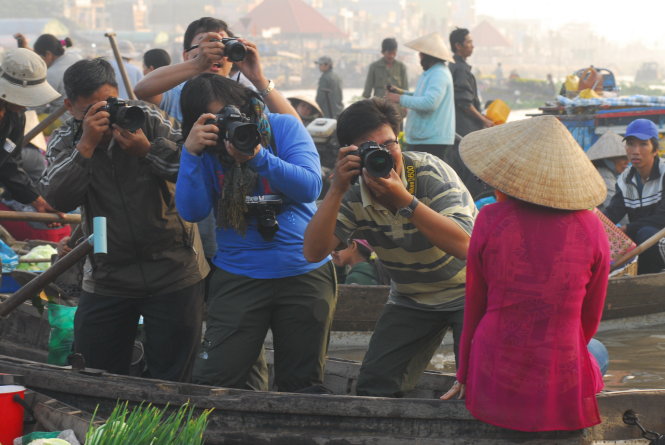Many celebrated Vietnamese photographers whose works sold well in the past have lamented that they are experiencing the toughest time ever in marketing their photos.
Years ago, reputable artistic photographers would take extended trips to take photos of the country’s stunning landscapes and cheery people.
Their photographic works would prove useful during photo sale seasons, which last from March to August each year.
Such famed photographers as Dao Hoa Nu, Hoang The Nhiem, Kim Son, and Nguyen Trung Thu sold 100-200 of their photos each season and earned some VND300-500 million (US$14,150-23,584).
These amounts were a considerable source of income to photographers, along with their earnings from selling their photos to advertisers or service providers.
However, these trips have been few and far between in recent years.
Seasoned photographer Hoang The Nhiem, considered the 'king' of Vietnamese landscape photos and one of those most keen on long photo trips, is now reluctant to undertake these projects.
“We face great difficulty selling our works to calendar producers, as demand has dropped notably in recent years. Small photos can easily be downloaded from the Internet for casual advertisements,” he said.
He added that professional photographers are only needed for occasional major advertising projects, which require quality, large-size photos.
As local demand for photos drops, Nhiem has tried launching photo exhibits in other countries, but the exhibitions have not fared well either due to the global economic malaise.
The photographer blamed plummeting demand on the ready availability of hi-end cameras and tools, which allow total laymen to take perfect average photos.
Moreover, photo resources on the Internet feature diverse content and are readily at hand.
Veteran photographic artists, who consider their works to be their loved brainchildren, are also faced with intense competition from less experienced photographers.
“These days, young amateurs have more than enough time, money and means to travel around for pictures. They just need to accompany veteran photographers a few times to know where and when to take nice snapshots. They sell their photos at low prices, as what counts most to them is the fun and fame the photos give them,” explained Dao Hoa Nu, a seasoned photographer.
Photographer Kim Son said that during previous photo selling seasons, he sold more than 100 photos and earned a good income.
“Photographers can no longer survive solely on their profession,” he said sadly.
Nu added that her current main income comes from creating photo books and occasional projects.
Commercial photographers also struggle
Just like their artistic counterparts, commercial photographers are also facing fierce competition.
Hoang Truong, a famed commercial photographers, said that Ho Chi Minh City used to be a wonderland for bridal and wedding reception photos, as people get married every day.
The photographer explained that his well-known colleagues typically have a professional team in charge of Photoshop, kit and supplies, all a must for high-quality, professional bridal photos.
By contrast, their fledgling competitors hire only amateurs and fresh college graduates to minimize expenses.
Such service providers also charge low prices.
Truong added that a number of professional photographers have resigned themselves to opening shops in alleys instead of on large roads to cut costs.
Rampant copyright breaches
Amidst such relentless competition and poor photo demand, artistic photographers are also plagued by rampant piracy of their works, which is facilitated by the boom of the Internet and digital technology.
Apart from small-scale copyright violations, local photographers are also facing an increasing number of large-scale piracy cases.
Photographer Dang Ke Dong, vice head of the Hoi An Photography Club, and some of his colleagues set up an 'ambush' to catch large-scale copyright violators in the act early last month.
After learning that a studio in central Vietnam’s Da Nang City was developing a large number of their works without permission, the photographers 'stalked' the business and secretly notified relevant agencies.
The raid seized 72 large photos while they were being carried into a hotel in Hoi An town in central Quang Nam Province.
Early this year, photographer Ba Han also voiced his complaints against British-Dutch company Unilever’s illegal use of one of his works in a television program.
The company then offered a feeble excuse that they were kept in the dark by their partner about the illegal downloading of the photo from the Internet, and agreed to pay a compensatory sum which was significantly smaller than that demanded by Han.
The incident quickly fell into oblivion.
Nhiem, the 'king' of Vietnamese landscape photos, said that he also noticed copyright violations of his works, but did not seek compensation, or even accountability, from those involved.
To cope with the situation, the photographer had no choice but to buy photo developing and printing equipment in order to publish his works in small-size formats and render them unable to be downloaded from the Internet.
Like us on Facebook or follow us on Twitter to get the latest news about Vietnam!


















































